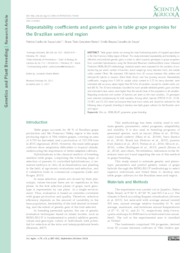Repeatability coefficients and genetic gains in table grape progenies for the Brazilian semi-arid region.
Repeatability coefficients and genetic gains in table grape progenies for the Brazilian semi-arid region.
Author(s): LEAO, P. C. de S.; NUNES, B. T. G.; SOUZA, E. M. C. de
Summary: Table grape stands out among the main fruit-bearing plants of irrigated agriculture in the São Francisco Valley region of Brazil. This study estimated repeatability and heritability co-efficients and predicted genetic gains in order to select superior genotypes in grape progenies from controlled hybridizations using the Restricted Maximum Likelihood/Best Linear Unbiased Prediction (REML/BLUP) methodology. Individual plants were evaluated for the variables of production (kg per plant), number of bunches, bunch weight (g), berry diameter (mm), and soluble solids content (°Brix). We evaluated 194 hybrids from 30 crosses between Vitis vinifera and interspecific hybrids in Juazeiro, Bahia State, Brazil, over four growing seasons. Repeatability coefficients, ranging from 0.164 for soluble solids content to 0.72 for berry diameter, were estimated with accuracy values higher than 80 % for all variables, except for soluble solids content (66 %). The 30 best individuals classified for each variable exhibited genetic gains and their new estimated mean values were higher than the overall mean of the population in all variables. Regarding production and number of bunches per plant as the main variables, 15 genotypes were selected simultaneously for both variables. Among which, hybrids CPATSA 15.05, 15.06, 15.06T, and 23.103 stand out because they have trace seeds and should be selected for the following steps of genetic breeding to develop new table grape cultivars for the Brazilian semi-arid region.
Publication year: 2018
Types of publication: Journal article
Unit: Embrapa Semi-arid Region
Keywords: Grapes, Hibrido, Melhoramento Genético Vegetal, REML BLUP, Uva, Uva de mesa, Vale do São Francisco, Vitis
Observation
Some of Embrapa's publications are published as ePub files. To read them, use or download one of the following free software options to your computer or mobile device. Android: Google Play Books; IOS: iBooks; Windows and Linux: Calibre.
Access other publications
Access the Agricultural Research Database (BDPA) to consult Embrapa's full library collection and records.
Visit Embrapa Bookstore to purchase books and other publications sold by Embrapa.

